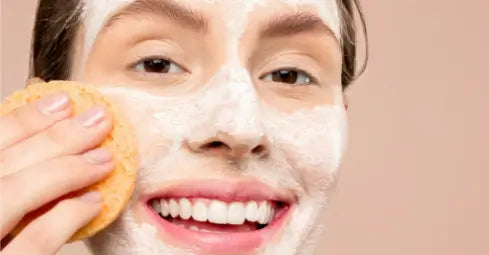Acne is a usual and frustrating skin condition that affects people of all ages. You've probably heard the advice to avoid touching your face to prevent breakouts.
But is there any truth to this? Can the simple act of resting your chin on your hand really lead to acne? This article will explore the connection between touching your face and acne and provide practical tips to keep your skin clear.
What is Acne?

Acne, a skin condition, develops when oil and dead skin cells block hair follicles. It manifests in different forms, including:
- Whiteheads: Closed clogged pores that appear as white bumps.
- Blackheads: Open clogged pores that look black due to oxidation.
- Papules: Small red, tender bumps.
- Pustules: Pimples containing pus.
- Nodules: Large, painful lumps beneath the skin.
- Cystic acne: Deep, pus-filled lumps that can cause scars.
Common Causes of Acne
Several factors can contribute to the development of acne, including:
- Hormonal Changes: Fluctuations in hormones, especially during puberty, menstruation, and pregnancy, the skin can produce more oil.
- Genetics: A family history of acne can increase your likelihood of developing it.
- Diet: Some studies indicate that certain foods, specifically dairy and sugary foods, can trigger acne.
- External Factors: Environmental factors like pollution and lifestyle habits like skincare routines can impact your skin's health.
The primary culprits in acne formation are excess oil production, bacteria, and inflammation. Understanding these factors helps set the stage for examining how touching your face might influence acne.
How Touching Your Face Can Affect Acne
Now, let's address the core question: Does touching your face cause acne? The short answer is yes, it can contribute to acne, but it's not the sole cause.
Transfer of Oils and Bacteria
Touching your face can carry bacteria from your hands to your skin. It also introduces oils. Here's how it works:
- Hands Carry Oils and Bacteria: Your hands touch numerous surfaces throughout the day, accumulating dirt and bacteria. This also leaves you with oily skin.
- Clogged Pores: When you touch your face, these substances can transfer to your skin. These substances clog your pores and can lead to breakouts.
Irritation and Inflammation
Physical contact with your face can also lead to irritation and redness:
- Skin Irritation: Frequent touching, picking, or scratching can aggravate your skin, making it more prone to acne breakouts.
- Inflammatory Response: This irritation can trigger an inflammatory response, worsening existing acne and making it more painful.
Preventive Measures and Best Practices

To minimize the impact of touching your face on acne, consider adopting the following preventive measures and best practices.
Maintaining Clean Hands
Hand hygiene is key in preventing acne:
- Frequent Hand Washing: Always wash your hands with soap and water before touching your face.
- Hand Sanitizer: Carry hand sanitizer for situations where washing isn't possible.
Behavioral Changes to Reduce Face Touching
Overcoming the habit of touching your face can notably improve your skin's health:
- Keep Hands Busy: Use fidget toys or other distractions to substitute the behavior of touching your face. This keeps your hands occupied.
- Mindful Practices: Practice mindfulness to become more aware of when you're touching your face and consciously stop.
Skincare Routine Tips
The right skincare routine can help prevent or get rid of acne:
- Gentle Cleansers: Use mild, non-comedogenic facial cleansers that won't clog pores.
- Regular Exfoliation: Exfoliate your skin regularly to eliminate dead skin cells that can clog pores.
- Moisturizing: Keep your skin hydrated with the correct moisturizer to maintain its natural barrier.
- Applying sunscreen: Even though sunscreen cannot directly treat acne, it helps prevent further irritation.
Tips to Prevent Touching Your Face and Reduce Acne
Preventing acne caused by touching your face requires a conscious effort to avoid touching your face, even though it can be hard to break the habit. Here are some tips to help you reduce the frequency of touching your face:
- Keep your hands busy: When you find yourself reaching for your face, try to keep your hands busy by doing something else, like holding a stress ball or fidgeting with a pen.
- Carry hand sanitizer always: Regular hand sanitization will help to keep you mostly bacteria free, meaning acne will be less likely to form.
- Wash your hands regularly: Washing your hands regularly can help remove bacteria and other impurities that can transfer to your face.
- Use non-comedogenic skincare products: Non-comedogenic skincare products are designed to be less likely to clog pores, reducing the risk of acne.
Other Factors That Contribute to Acne
Touching your face is just one piece of the puzzle. Several other factors can influence acne development.
Diet and Nutrition
Your diet can greatly affect your skin's health:
- Acne-Trigging Foods: High glycemic index foods and dairy products have been linked to increased acne.
- Dietary Changes: Opt for a balanced diet of fruits, vegetables, and lean proteins to support clear skin.
Stress and Hormonal Changes
Stress and hormones can also play a major role in acne:
- Hormonal Imbalances: Stress can cause hormonal changes that exacerbate acne.
- Stress Management: Include stress-relief methods like exercise, meditation, and adequate sleep to help balance hormones.
Debunking Myths About Acne
Many myths surround acne, and it's important to separate fact from fiction.
Myth: Only Teenagers Get Acne
In contrast to a popular belief, acne is not exclusive to teenagers:
- Adult Acne: Acne can affect individuals of all ages. Many adults experience breakouts well into their 30s, 40s, and beyond.
- Statistics: Studies show that up to 25% of women and 12% of men in their 40s suffer from acne.
Myth: Acne is Caused by Poor Hygiene
While hygiene is important, acne is influenced by multiple factors:
- Overwashing: immoderate cleansing can strip the skin of natural oils, causing heightened oil production and more breakouts.
- Balanced Approach: A balanced skincare routine that cleanses without over-drying is essential for managing acne.
Introducing Derma Organics Remedies For Acne

With active ingredients such as organic Indian Turmeric Root, this powerful soap not only addresses skin concerns such as acne, eczema, dark spots and lack of radiance, but lets you enjoy a luxurious spa-like experience right at home.
Using this product can result in calmer, less irritated skin, which is no longer dry or inflamed. You can maintain a healthy skin routine by using our organic Turmeric Root Bar. In addition to nurturing the skin, turmeric soap for acne penetrates deeply into the skin to make it glow.

The derma organics acne-buster is ideal for those suffering from oily, shiny, acne-prone skin. You’ll also benefit from using this all-inclusive package if your skin is prone to inflamed follicles (folliculitis), redness, enlarged or clogged pores, or is easily irritated by heavy, pore-clogging ingredients. Featuring some of our most popular products and one of the best face wash for acne our derma organics acne-buster package has been created to give you ultimate skin confidence every day.
If you have severe acne, it is essential to seek professional help to manage your condition effectively. Remember, prevention is always better than cure, so make sure to take care of your skin to prevent acne from developing in the first place.

Frequently Asked Questions
Does picking your face cause acne?
Yes, picking at your skin can introduce bacteria and cause irritation, leading to more breakouts and potential scarring.
Can rubbing your face too hard cause acne?
Yes, excessive rubbing can irritate the skin, lead to redness, and make your acne worse.
If I stop touching my face, will my acne go away?
Reducing face touching can help prevent new breakouts, but other factors like hormones and skincare routines also play a role in managing acne.
Is it bad for your skin to touch your face?
Touching your face can leave oils and bacteria, contributing to acne. It's best to avoid unnecessary contact and maintain good hand hygiene.



